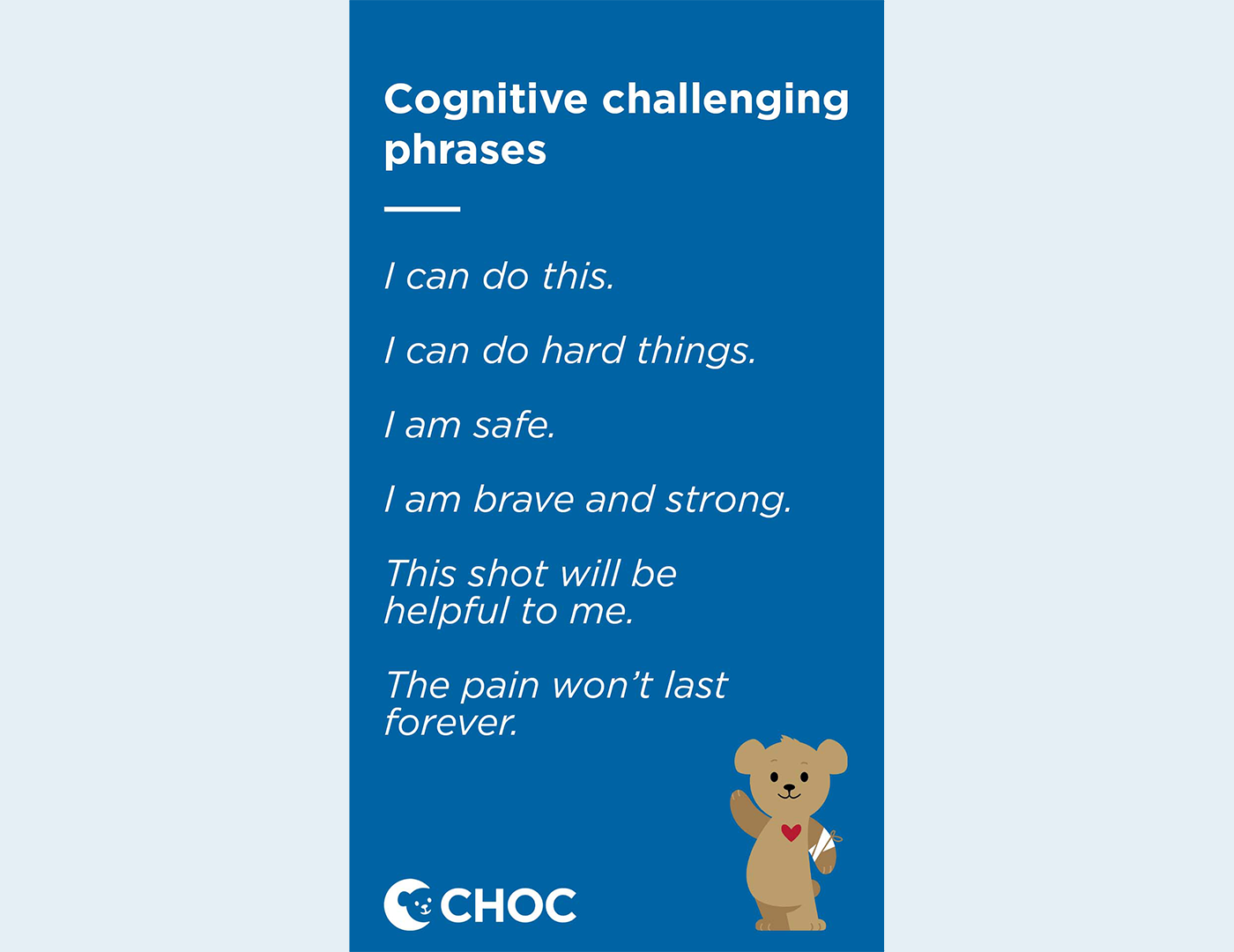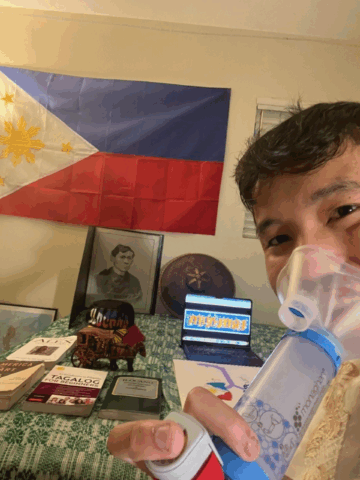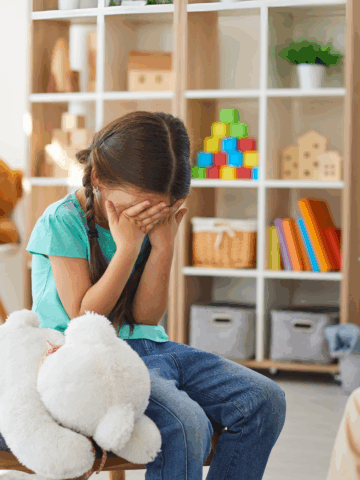How to help kids with needle phobia
With many children back in school during the COVID-19 and the flu season, vaccinations are a vital way to protect their health. For some children, vaccines cause minimal distress; however, other children may experience more significant distress which can lead to Trypanophobia, or needle phobia.
Research suggests that about 40% of children worldwide under age 12, and 20% of adolescents have a fear-driven physical or emotional response to needles — causing some to try to avoid necessary vaccines or medical treatment entirely.
Here, Dr. Amy Morse, a pediatric psychologist at CHOC, wants to help parents understand these fears and apply developmentally appropriate strategies to help their children cope with their fear and prioritize their health.
How can parents help ease their kid’s fears of needles?
Children who experience a fear of needles that triggers a vasovagal response – increase in heart rate or temporary fall in blood pressure – may benefit from anxiety management strategies. Dr. Morse suggests the following practical tools to parents to help kids and teens cope with their fear of needles:
Give appropriate choices
Parents know their children the best and are likely to already be using some helpful strategies to reduce fear of needles, says Dr. Morse. Some of these strategies include giving children appropriate choices. For example, parents may encourage their child to count to 2 or 3 before the medical professional administers a vaccine. This helps increase a child’s perceived sense of control and in turn, reduces anxiety. Parents may also ask if a child would like to look at the needle or look away.
“As a child, I had needle phobia and always chose to look away,” says Dr. Morse. “In fact, I still do today.”
Focus on preferred activities
While engaged in preferred activities, children are more likely to remain calm. Parents are encouraged to redirect a child’s attention away from the needle and toward a preferred activity such as a video, story, or song. Playing I Spy games can also be a helpful way to keep kids actively engaged in a preferred activity while sitting still.
Position for comfort
During vaccine administrations, Dr. Morse recommends that parents talk with a nurse or medical professional about possibly positioning a child for comfort. She explains that children feel most vulnerable while lying on their backs. Allowing children to sit upright, possibly on a parent’s lap, helps increase a child’s comfort while reducing symptoms of anxiety during a vaccine administration.
Relaxation techniques
Before or during an experience with a needle, parents can help ease their child’s anxiety and symptoms by teaching them how to relax using the following strategies:
- Practice taking slow, deep breaths together. Parents may count to two or three as a child inhales and then three or four as a child exhales.
- Parents may draw butterfly wings on the palm of their hand with an index finger. Have a child inhale as one wing is drawn and exhale for the second wing.
- Squeezing a hand or stuffed animal in the hand opposite the vaccine site while taking deep breaths.
Watch videos on additional coping strategies.
Working with worry (cognitive challenging)
With this technique, parents can assist their kids with the process of identifying and challenging worries or negative thoughts. To do this, parents can help challenge their kids’ negative and fearful thoughts about needles by saying the following phrases together:
- “I can do this.”
- “I can do hard things.”
- “I am safe.”
- “I am brave and strong.”
- “This shot will be helpful to me.”
- “The pain won’t last forever.”
Parents of children who receive care in a children’s hospital or medical clinic may seek the support of a Child Life Specialist to help a child cope with their fear of needles.

 Print these cognitive challenging phrases
Print these cognitive challenging phrases
What causes the fear of needles?
The fear of needles is caused by classical conditioning. A child may receive a vaccine when they are young and start to associate the pain that it caused with needles, in general. Understandably, they develop a fear and will do anything to avoid that scary thing.
In extreme cases, the fear of needles may stick with children and teens throughout their lives, causing them to avoid medical treatment involving needles. It’s important for parents to help their kids and teens develop anxiety management strategies so that they can get the necessary treatment to protect their health.
What are the symptoms of needle phobia?
There are two main types of responses that people who are afraid of needles have, says Dr. Morse.
First, kids and teens who are fearful of needles may feel sweaty and get nervous before a needle poke, but they are able to suppress their response enough to get through the experience.
The second response is more severe. Some kids and teens have a strong vasovagal response with physiological symptoms that are associated with the pain of a needle like feeling faint and sweaty, and they may have an increased heart rate or heart palpitations.
In addition to the vasovagal physical symptoms, there are some cognitive symptoms too. Some kids and teens may worry that the pain will never go away and develop irrational fears. For younger kids with imaginative thinking, they may get very confused and scared, wondering if that needle will be in their arm forever.
Is it possible for kids to completely get past their fear of needles?
For most, practicing the techniques mentioned above can address the singular fear of needles, says Dr. Morse. They may be able to apply anxiety management strategies to reduce the intensity and frequency of their fear — moving from having a severe physical response to a milder one that they can suppress to get through the experience.
When should a parent seek help from a professional for needle phobia?
Dr. Morse says that if parents feel like their child’s fear of a needle is impacting their day-to-day life by constantly thinking of an upcoming vaccine; having nightmares about needles; or not enjoying activities that they normally would; it’s time to seek professional support.
Children who experience significant or prolonged distress associated with needles may benefit from therapy to help them develop coping strategies to manage anxiety symptoms. The best way to ease children’s fears of needles is to use the evidence-based treatment of cognitive-behavioral therapy (CBT), says Dr. Morse. Cognitive-behavioral therapy helps children recognize the relationship between their thoughts, feelings and behavior.
Through CBT, children learn coping strategies to manage anxiety symptoms and then apply the strategies while they engage in a feared activity (e.g., needle pokes). A variety of licensed mental health providers in the community offer CBT.
Get more expert health advice delivered to your inbox monthly by subscribing to the KidsHealth newsletter here.
Learn more about vaccines
Learn why vaccinating your children is so important from the pediatric infectious disease experts at CHOC.





